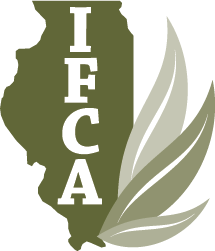Illinois Nutrient Loss Reduction Strategy is Released
Yesterday afternoon, Illinois EPA and the Illinois Dept of Ag released the final version of the state's Illinois Nutrient Loss Reduction Strategy. This 163 page document is a result of nearly 3 years of collaborative work led by IEPA and IDA involving stakeholders from agriculture, wastewater treatment, environmental groups and academia. Illinois agriculture must reduce nitrogen and phosphorus losses from the non-point sector to improve Illinois rivers, lakes and streams as well as improve downstream impacts to the Gulf of Mexico. IFCA participated in the development of the document and is very engaged in the process as our industry utilizes 4R approaches to reduce losses. While there are assumptions about the levels of nutrient loss and the best methods to reduce losses, the bottom line is that Illinois agriculture must do its part and make progress, and it will take more management of nutrient applications combined with other conservation practices to meet the goals in the document. If we fail to make progress, then voluntary efforts will give way to regulatory approaches.
IFCA members are well positioned to provide agronomic recommendations and services to help reduce nutrient losses and assure profitability for our customers. Please visit our website at www.ifca.com to view or download the Strategy's executive summary, press release (with quote from IFCA) and the 163 page strategy. We recommend that our members read chapters 3 and 6 in particular as it lays out the assessment of the problem and the path to success if we all engage in this process. Everyone must do something to reduce nutrient losses and agriculture is not alone: wastewater treatment plants, regulated industries and urban areas are all stakeholders in this effort. If you have questions please contact IFCA at 309.827.2774.
Check out the IFCA 4R Code of Practice here and a STOP poster that reinforces the nutrient practices that will reduce losses. In August we will officially launch the Keep it 4R Crop program and ask our members to "take the pledge" on a special 4R website and ensure ownership of our nutrient future.
